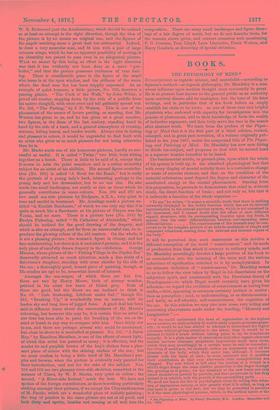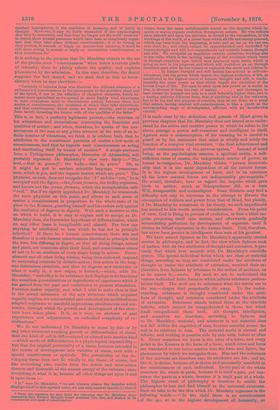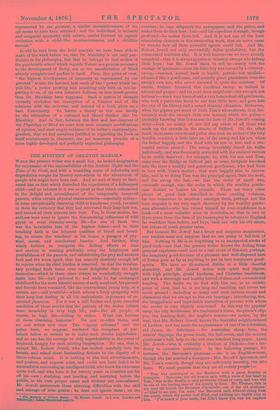BOOKS.
THE PHYSIOLOGY OF MIND.* EVOLUTIONIST as regards science, and materialist—according to
Spinoza's method—as regards philosophy, Dr. Maudsley is a man whose influence upon modern thought must necessarily be great.
He is at present best known to the general public as an authority upon cerebral disease and its analogues, but the tone of his later writings, and in particular that of the book before us, amply establish his claim to be viewe as one of those rare and helpful physicists who, endowed with capacity for investigation into the
genesis of phenomena, add to their knowledge of facts the wealth of inductive argument, and thus truly serve the race in the search after abstract truth. We learn from the preface of the Physio- logy of Mind that it is the first part of a third edition, revised, enlarged, and in great part rewritten, of a volume originally pub-
lished in the year 1867, under the compound title of The Physio- logy and Pathology of Mind. Dr. Maudsley has now seen fitting to divide his subject, and proposes to deal with its second head in a separate treatise hereafter to be issued.
The fundamental article, or ground-plan, upon which the whole of his system is built up, is the admitted physiological fact that with every display of mental activity there is a correlative change or waste of nervous element, and that on the condition of the material substratum must depend the degree and character of the manifested energy or the mental phenomenon. Starting from this proposition, he proceeds to demonstrate that mind is, without doubt, the direct function of brain ; and not only so, but that it is indirectly a function of the whole organism :—
" To me' "he writes, "it seems a scientific truth that there is nothing outwardly displayed in the bodily function which has not its internal representation in the central nervous system, which is not contained in the innermost, and I cannot doubt that the effect of each different organic structure, with its corresponding function upon the brain, is special, that the outer differentiations betoken corresponding inner differentiations The consciousness of the moment may be con- ceived to be the complex product of an infinite multitude of simple and compound vibrations, coming from the external and internal organs of
the body." •
It will be perceived that such statements as this involve a different conception of the word " consciousness " and its mode
of production from that which it conveys to ordinary minds, and
Dr. Maudsley accordingly devotes it large portion of his book to an examination into the meaning of the term and the various inflections of signification attached to it by metaphysicians. In his ultimate definition of "consciousness," Dr. Maudsley seems to us to follow the view taken by Hegel in his dissertation on the subjective spirit, and consistently with the Darwinian theory of
Development—to which Hegel would certainly have given his adhesion—to regard the evolution of consciousness as having four stadia,—first, appearing as sensuous certainty instinct in matter; then as perception ; next, as understanding, or as discrimination ; and lastly, as self-identity, self-consciousness, the cognition of the ego. In this relation we may also note some very telling and interesting observations made under the heading, "Memory and Imagination" :—
"If we would understand the laws of organisation in the highest nerve-centres, we shall certainly do well to study organic processes gener- ally; it would be not less absurd to attempt to understand the higher processes without giving attention to the lower, than it would be to attempt to build a house without taking pains to lay its foundations securely. It is a plain matter of observation that other organic elements besides nervous elements perpetuate impressions made upon them, which they may accordingly in a certain sense be said to remember ; the virus of small-pox, for exa'mple, makes an impression upon all the elements of the body, which they never lose, although it becomes fainter with the lapse of time ; in some unknown way it modifies their constitution, so that ever afterwards their susceptibilities are changed. The scar which is left after the healing of a wound in a child's finger keeps the same relative proportion to the finger through life, growing as it grows ; for the elements of the new tissue not only renew themselves particle by particle, and thus perpetuate it, but they
extend it in relation with the growth of the surrounding parts We need not brave the fire of psychological scorn by calling this reten- tion of impressions memory, or care greatly what it is called, so long as due heed is given to the fact; but we may be permitted to perceive in it the same physiological process, which, in the cortical layers of the
• The Physiology of Mind. By Henry Mandalay, M.D. London : Macmillan and Co. ISM.
cerebral hemispheres, is the condition of memory, and of habit in thought. Moreover, it may be fairly demanded of the psychologists that they be consistent, and that they no longer use the word ' memory ' to denote those mental processes which have been so completely organ- ised that they take place without consciousness ; if it be wrong, as they profess, to assume or imply an unconscious memory, it must be still more wrong to assume or imply an unconscious consciousness, as they sometimes do."
It is nothing to the purpose that Dr. Maudsley objects to the use of the precise term "consciousness "when below a certain grade of intensity, since he plainly admits the quality, and explains phenomena by the admission. In this case, therefore, the denial supposes the fact denied, and we shall find in him no incon- sistency when he says elsewhere :— " Certainly it behoves those who discover the diffused elements of a rudimentary consciousness in the movements of the sensitive plant and of the hydra, if not in the affinities of chemical elements, which be- comes more specialised as we ascend to more highly vital structures, to take scrupulous heed to discriminate plainly between these low modes of consciousness, the existence of which they infer objectively, and that consciousness which alone we know directly, and to refrain from tacitly investing the former with all the qualities of the latter."
This is, in fact, a perfectly legitimate protest,—the outcome of his admissions and enunciations concerning the functions and qualities of matter ; and when, therefore, he speaks of the con- sciousness of the man at any given moment as the sum of an in- finite number of vibrations, we think it is evident both that he attributes to the constituent particles of matter a low mode of consciousness, and that he regards such consciousness as acting and manifesting itself by means of motion.* A single sentence from a Pythagorean philosopher, Hieroeles of Alexandria, will probably represent Dr. Maudsley's view very fairly :—" The soul,—that is, yourself; the body,—that is, yours." Or, as it might be put in modern scientific language, "conscious- ness, which is you, and the organic tissues, which are yours." The physicist, as such, does not recognise the "I" and the "you," he is occupied with the figure,—theformaformata, the bodily organism, and knows not the forma formans, which the metaphysician calls 46 soul." But if we rightly apprehend Dr. Maudsley, he transcends the mere physicist on this point, and allows to each atom of matter a consciousness in proportion to the whole ratio of its place in the Kosmos, guarding himself and his readers only against the confusion of degrees in dignity. With such a doctrine as this on which to build, it is easy to explain and to accept, as Dr. Maudsley does, the Darwinian hypothesis of differentiation, which on any other basis is inexplicable and absurd. For how can anything be attributed to man which he has not in principle inherited ? If there be a human consciousness, there was and therefore is a sub-human consciousness identical in principle with the first, but differing in degree, so that all living things, animal and plant, are conscious after their kind, and consciousnes comes at last to be an attribute of every single being in nature. Nerve- element and all other living tissues, being thus endowed, respond to environing relations by definite action ; this action in the long- run determines structure, and thus by degrees new structure, or 'what it really is, a new organ, is formed,—which, adds Dr. Maudsley, "embodies in its substance and displays in its functions the countless generalisations or ingredients of experience which it has gained from the past and contributes to present stimulation. Function makes capacity, and what I wish to make clear is that in the actual substance of the new structure which acquired capacity implies, are concentrated and embodied the multitudinous adapted responses to manifold impressions, simultaneous and suc- cessive, through which the growth and development of the struc- ture have taken place. It is, as it were, an abstract of past
experiences and adjustments, an embodied complexity of co- ordinations." .
We do not understand Dr. Maudsley to mean by this or by any other statement touching growth or differentiation of tissue, that one kind of cell is differentiated or altered into another kind —which mode of differentiation is a physiological impossibility—. but that the original potentiality of a tissue becomes extended in the course of development into varieties of tissue, each with a epecial sensitiveness or aptitude. The potentiality of the de- veloping tissue does not lie wholly in the tissue, of course, but like everything else, results from the action and inter-action thereon and therewith of the unseen energy of the universe; since everything is what it is, because all other things act upon it and it upon them :—
"If," says Dr. Maudsley, "we ask whence comes the impulse which displays itself in this upward nisus, we can only answer lamely (1) that it
• From this sentence we may draw the inference that Dr. Maudsley, more reasonably than Herbert Spencer, would postulate Life first, and Motion as its consequence and mode of manifestation.
conies from the same unfathomable source as the impulse which in- spires or moves organic evolution throughout nature. He who reflects upon himself and upon the universe is forced to the recognition, in the workings of the world, of a power from which all life and energy proceed, which has been from the beginning, is now, and as far as we can see, ever shall be; and which cannot be comprehended and controlled by human thought and will, but comprehends and controls human thought and will. We recognise an impulsion outside ourselves, working also in our wills, which is the moving energy of the evolution which went on through countless ages before man appeared upon earth, which is going on now in his progress, and which will doubtless go on through countless ages after he has ceased to replenish the earth and subdue it. In human thought and will nature has arrived at self-con- sciousness, but the power which impels the highest evolution of life as manifested in the highest reach of human thought and will, is funda- mentally the same power as that which impels the evolution of the lowest forms of life. For. man to seize upon this power as it works in
him, to divorce it from the rest of nature and thereupon to base claims for himself not only to a rank infinitely higher than, and to a destiny entirely different from, that of anything else in the universe, but to be the end and purpose of creation, may be set down as a proof that nature, having reached self-consciousness, is like a youth at the corresponding stage of development, afflicted with an insufferable conceit."
It is made clear by the definition and genesis of Mind .given in previous chapters that Dr. Mandsley does not intend as to under- stand by the active and creative power to which he refers in the above passage a power self-conscious and intelligent in itself. Against such a misconception of his meaning he is careful to guard us by the statement that mind is wholly and solely the function of a complex vital structure, "the final achievement and
perfect consummation of the nervous system." Instead of mind being, as the psychologists assume, a spiritual entity, a self- sufficient cause of causes, the independent source of power, an honest investigation, Dr. Maudsley thinks, "proves incontest- ably that it is the most dependent of all the natural forces.
It is the highest development of force, and to its existence all the lower natural forces are indispensably pre-requisite."
He would, therefore, have us regard the impulse which gave birth to matter, much as Schopenhauer did, as a bare Will, irresponsible and unintelligent. Some thinkers may find a difficulty not easy to overcome in the attempt to divorce the conception of volition and power from that of Mind, but plainly, if Dr. Maudsley be consistent in his theory, no such impediment has seemed to him worth serious consideration. From his point of view, God is Being in process of evolution, at first a blind im- pulse projecting itself into matter, and afterwards gradually accumulating perfection by development of organism until it attains its fullest expression in the human brain. God, therefore, has never been greater in intelligence than man at his greatest.
We have named Spinoza as Dr. Maudsley's apparently elected master in philosophy, and in fact, the view which Spinoza took of matter, with its two attributes of thought and extension, is pre.
cisely that which best accords with Dr. Mandaley's scientific system. The special individual forms which are ideas or material things, according as they are considered under the attribute of thought or under the attribute of extension, received their ex- planation from Spinoza by reference to the notion of accident, or as he names it,—modus. By modi we are to understand the various individual finite forms in which infinite substance particu- larises itself. The modi are to substance what the waves are to the sea,— shapes that perpetually die away. To the under-
standing, substance is thought considered under the attri- bute of thought, and extension considered under the attribute
of extension. Substance stands behind them as the absolute infinite, which cannot be comprehended in them, but which itself comprehends them both. All thought, intelligence, and sensation are therefore, according to Spinoza and to Dr. Maudsley, material, and whatever is not material does not fall within the cognition of man, because material means the real in its relations to man. The material world is eternal and
infinite, and nothing is possible side by side with, before or after it. Every sensation we know is the ictus of a force, and every
point in the Kosmos is the locus of a force, which ictus and locus are translated in our nerve-centres into the form and figure, the phenomena by which we recognise them. Man and the substance of the universe are therefore one, its attributes are his ; and he, like it, is divine, because all is divine and necessarily manifold in
the consciousness of each individual. Every part of the whole conceives the whole in parts, because it is itself a part, yet con-
ceives the parts as a whole, because it is itself part of a whole. The highest reach of philosophy is therefore to enable the
philosopher to lose and find himself in the universal existence.
Such we take to be the idea which Dr. Maudsley expresses in the following words :—" In the child there is no consciousness of the ego, so in the highest development of humanity, as
represented by our greatest, a similar unconsciousness of the ego seems to have been attained ; and the individual, in intimate and congenial sympathy with nature, carries forward its organic evolution with a child-like unconsciousness, and a childlike success."
It will be seen from the brief analysis we have been able to make of the work before us, that Dr. Mandsley is not only pan- theistic in his philosophy, but that he belongs to that section of the pantheistic school which regards Nature sea process necessary to the development of Deity, not as the manifestation of Mind already complete and perfect in itself. From this point of view, "the highest development of humanity as represented by our greatest" is also the-last and best reach of the "power which im- pels life," a power growing and acquiring only with us, not im- parting to us, of its own inherent fullness, as men much greater than Dr. Maudsley have supposed. Such a system of thought virtually abolishes the conception of a Creator and of His relations with the universe, and instead of a God, gives us a bare Potentiality. So barren a theory as this can hardly be the ultimatum of a cultured and liberal thinker like Dr. Mandsley. And in fact, between the first and last chapters of the Physiology of Mind we meet with such constant modifications of opinion, and such ample evidence of its writer's continual pro- gression, that we feel ourselves justified in regarding the book as itself evolutionary in character, the yet immature promise of a more highly developed and perfectly organised philosophy.




































 Previous page
Previous page